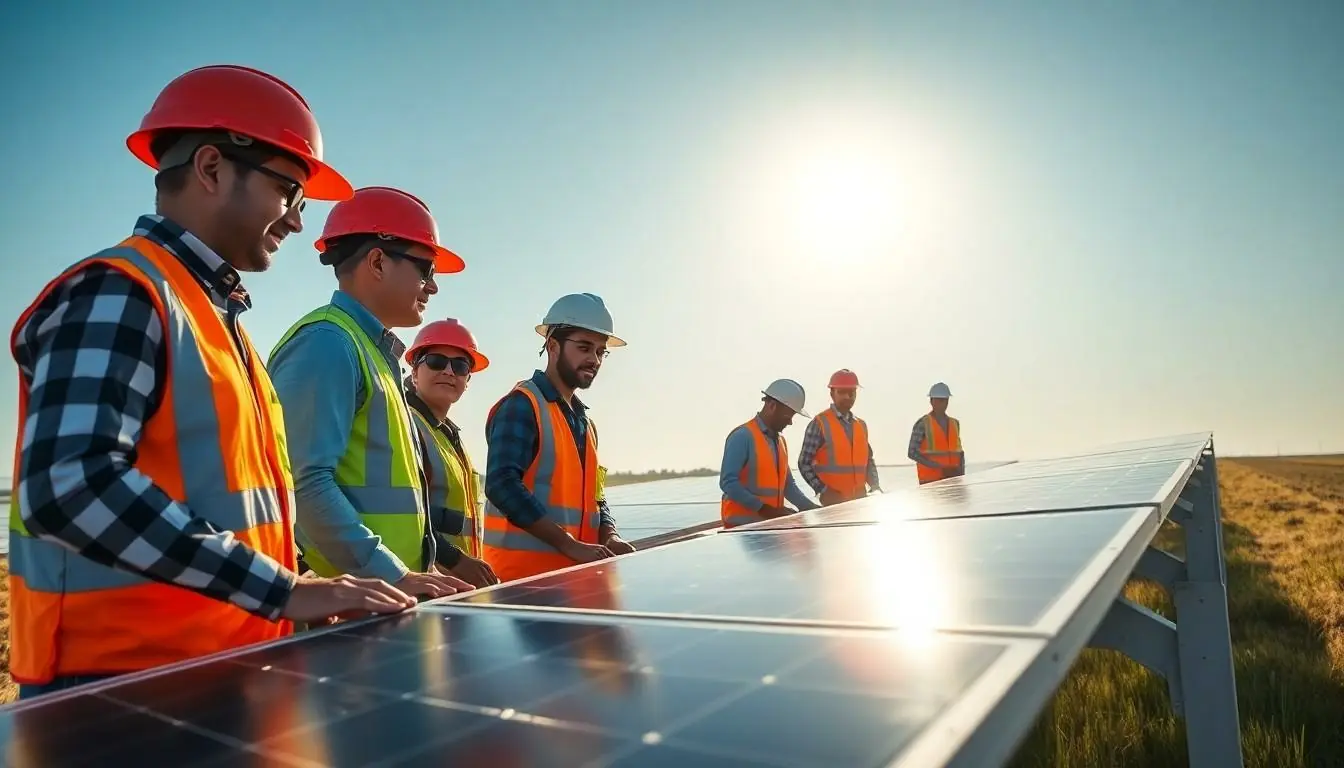In a world where fossil fuels are slowly becoming the villain in our environmental superhero saga, careers in renewable energy are stepping into the spotlight like the caped crusaders they are. With solar panels and wind turbines leading the charge, the industry is booming, and it’s not just saving the planet—it’s creating a wealth of job opportunities that are as diverse as a buffet at a vegan convention.
Table of Contents
ToggleOverview of Renewable Energy Careers
Renewable energy careers encompass a diverse range of roles aligned with sustainable practices. These jobs span various industries, including solar, wind, hydroelectric, and geothermal energy sectors. Professionals engage in research, engineering, project management, and policy advocacy, each contributing to advancements in clean energy.
Solar energy careers include solar panel installation, design, and maintenance. Specialists in this field install solar systems and optimize energy production. Wind energy professionals focus on turbine development, site assessment, and operational efficiency. They’re crucial in harnessing wind power to meet growing energy demands.
Environmental scientists evaluate the impacts of renewable energy projects. Their assessments guide sustainable practices and regulatory compliance. Additionally, energy efficiency experts develop strategies to reduce energy consumption, promoting sustainability while lowering costs.
Policy analysts advocate for renewable energy initiatives. They analyze legislation and measure the economic impact of renewable energy investments. Their efforts support the transition to a greener economy while creating new job opportunities.
Current statistics reflect a robust job market in renewable energy. The U.S. Bureau of Labor Statistics projects a 61% growth rate for solar installers from 2020 to 2030. Wind turbine technician positions are expected to grow by 61% in the same period, highlighting the sector’s potential for employment.
With a multitude of pathways available, individuals entering this field can find opportunities suited to varied skill sets. Innovative technologies and evolving regulations promise continual openings for those passionate about sustainable solutions. Emerging roles will likely focus on energy storage, grid modernization, and clean transportation, further expanding the career possibilities in this vital sector.
Types of Careers in Renewable Energy

Renewable energy careers encompass a variety of roles essential for a sustainable future. These positions cover key sectors such as solar, wind, hydroelectric, and geothermal energy.
Engineering and Technical Roles
Engineering and technical roles involve designing, developing, and maintaining renewable energy systems. Solar engineers focus on photovoltaic systems, optimizing efficiency and performance. Wind energy engineers specialize in turbine design, aiming for maximum output and safety. Technicians carry out installation and repairs for renewable technologies, ensuring they operate effectively. These professionals play a vital role in enhancing clean energy infrastructure. Skills in engineering principles and hands-on technical expertise are crucial for success in this area.
Research and Development Positions
Research and development positions focus on innovation in renewable energy technologies. Scientists conduct experiments to improve energy conversion efficiencies across various renewable sources. Renewable energy researchers explore new materials that enhance solar panels or wind turbines. Data analysts evaluate performance metrics to support ongoing sustainability strategies. This field emphasizes collaboration, linking universities and industry. Players in this sector contribute to groundbreaking solutions that elevate the clean energy landscape.
Policy and Advocacy Careers
Policy and advocacy careers target the creation and promotion of favorable renewable energy policies. Analysts evaluate legislation, assessing the potential impacts on energy markets. Advocates work to influence policymakers towards sustainable practices and investments. Communication specialists help convey the importance of renewable energy to the public and stakeholders. These roles require strong analytical and advocacy skills. Professionals in this area significantly shape the renewable energy landscape by promoting actionable change.
Skills Required for Success
Success in renewable energy careers demands a combination of technical and soft skills. Both types of skills facilitate effective contributions to this rapidly growing industry.
Technical Skills
Knowledge of renewable energy technologies stands vital for many roles. Solar panel installation requires proficiency in electrical systems and installation techniques. Wind turbine technicians benefit from understanding mechanics and engineering principles. Familiarity with energy modeling software enhances project management capabilities, allowing for better efficiency analysis. Data analysis skills support research roles, enabling professionals to interpret energy performance metrics. Expertise in environmental regulations ensures compliance with laws and promotes sustainability in projects.
Soft Skills
Problem-solving skills are essential to navigate challenges in renewable energy projects. Effective communication allows for clear collaboration among team members and stakeholders. Adaptability plays a key role, as technologies and policies evolve rapidly within the sector. Strong organizational abilities contribute to managing multiple projects simultaneously. Critical thinking fosters innovation, enabling professionals to develop creative solutions. Leadership skills guide teams toward achieving common project goals and advancing sustainable practices.
Benefits of Working in Renewable Energy
Renewable energy careers offer numerous advantages for professionals entering the field. These roles contribute to a more sustainable future while providing personal and economic benefits.
Positive Environmental Impact
Working in renewable energy significantly benefits the environment. Individuals contribute to reducing greenhouse gas emissions by promoting solar, wind, and other clean technologies. Each new installation and advancement in renewable systems helps combat climate change and fosters ecological preservation. This sector supports initiatives that protect ecosystems and biodiversity, aligning with global sustainability goals.
Job Stability and Growth Potential
Job stability in renewable energy presents a crucial advantage. The U.S. Bureau of Labor Statistics projects a 61% growth rate for solar installers and wind turbine technicians from 2020 to 2030. This growth reflects increasing investments in renewable infrastructure and government incentives for sustainable energy initiatives. Emerging roles in energy storage, grid modernization, and clean transportation further enhance career prospects, ensuring professionals find diverse opportunities in a dynamic industry.
The renewable energy sector offers a promising landscape for those looking to build fulfilling careers. With the ongoing shift towards sustainable practices and technologies, opportunities abound in various roles that contribute to a cleaner future. Professionals in this field not only enjoy job stability but also play a crucial role in combating climate change.
As investments in renewable infrastructure grow, so do the prospects for individuals entering this dynamic industry. By harnessing both technical and soft skills, aspiring professionals can position themselves for success in a field that’s not only vital for the planet but also ripe with potential for personal and professional growth.


